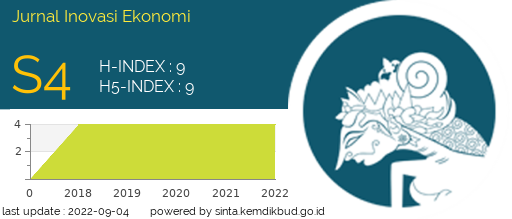MEMAHAMI “MAKNA LAIN” INSENTIF TERHADAP KINERJA BANK YANG HOLISTIK: PERSPEKTIF INTERDISIPLINER
DOI:
https://doi.org/10.22219/jiko.v4i01.7506Keywords:
Incentives, performance, customer, relationship, the managerAbstract
Theoretically, financial incentives motivate the employee to improve performance but also found empirical evidence that shows the financial incentives are often inversely proportional (Young and Lewis 1995; Jenkins et al 1998). Base on the phenomena is interesting to look more at the meaning of incentives for Customer Relationship Manager (CRM) in the performance improvements. This study uses an interdisciplinary perspective of management accounting, psychology, and spirituality and borrows psychological needs and spiritual theories to see the motivation of CRM in improving performance based on their needs. The method used is a case study with an interpretive approach. Qualitative data is obtained by conducting interviews with several CRM in one of a commercial bank. The results of this study found there are other meanings of incentives for CRM. These meanings are inclined about security, loyalty, and accountability for their work, the meaning of appreciation, self-actualization, and spiritual which defeats the meaning of basic needs. The meanings that arise not depending on the period of work or position but more on the awareness of each. Understanding these meanings can be taken into consideration in making the right incentive scheme for employees. So that, incentives can really motivate employees to improve their performance.
Downloads
References
Al-Quran dan Terjemahannya . (2006). Bandung: Penerbit Diponegoro
Bonner. S, A review of the effects of Financial Incentives on Performance in Laboratory task : Implications for Management Accounting
Bouckaerti, L & Zsolnai, L (2012) Spirituality and Business: An interdisciplinary Overview. Society and Economy 34 (2012) 3, pp. 489–514
Brophy,M (2015) Spirituality Incorporated: Including Convergent Spiritual Values in Business Ethics (2015) 132:779–794
Corner, P, D (2009).Workplace Spirituality and Business Ethics: Insights from an Eastern Spiritual Tradition. Journal of Business Ethics (2009) 85:377–389
Creswell.John W (2007). Qualitative Inquiry & Research Design. USA: Sage
Driscoll, C & McKee, M. Restorying a Culture of Ethical and Spiritual Values: A Role for Leader Storytelling. Journal of Business Ethics (2007) 73:205–217
Ewest, T,G (2015) Sociological, psychological and historical perspectives on the reemergence of religion and spirituality within organizational life. Journal of Religion and Business Ethics
Gotsis, G & Kortezi,Z (2008) Philosophical Foundations of Workplace Spirituality: A Critical Approach. Journal of Business Ethics (2008) 78:575–600
Kasmir (2004). Pemasaran Bank. Jakarta: Kencana Prenada Media Group
Krishna, A (2001). Ilmu Medis & Meditasi, Gramedia Pustaka Utama Jakarta
Kulik, Brian W (2005). Agency Theory, Reasoning and Culture at Enron: In Search of a
Solution. Journal of Business Ethics (2005) 59: 347–360
Mc Pherson, D (2015) Homo religiosus: does spirituality have a place in neo-Aristotelian virtue ethics?. Religious Studies (2015) 51, 335–346 © Cambridge University Press (2015)
Meng, Y (2016) Spiritual leadership at the workplace: Perspectives and theories (Review).
Biomedical Reports 5: 408-412, 2016408
Mursy, Austina L (2012). Eksplorasi Makna Laba dengan Pendekatan Etnografi. Jurnal Akuntansi Multi Paradigma : FEB UB
Saleh M. (2009). Bekerja dengan Hati Nurani. Jakarta: Erlangga
Siamat Dahlan. (2005). Manajemen Lembaga Keuangan Jakarta: FEUI
Triyuwono I. (1997). Akuntansi Syari’ah dan Koperasi: Mencari Bentuk Dalam Bingkai Metafora Amanah. Jurnal Akuntansi dan Auditing Indonesia Vol.1 No. 1
Triyuwono I & As’udi (2003). Sinergi Oposisi Biner: Formulasi Tujuan Dasar Laporan Keuangan Akuntansi Syari’ah. IQTISAD Journal of Islamic Economics. Vol. 4. (1) : 79 – 90
Velasquez. Manuel G. (2002) Busniness Ethics. Prentice hall: New Jersey
Wahyuni. Sri. Alimuddin, Darwis Said (2011). Laba dalam Perspektif Cinta. Jurnal Akuntansi Multi Paradigma : FEB UB








